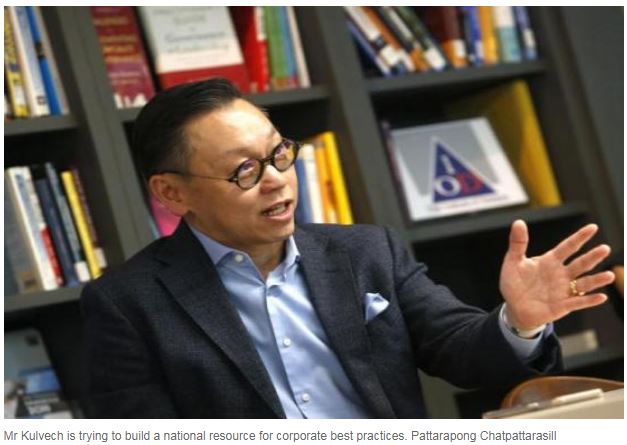Thailand: Quality boardrooms to sustain growth
Most board meetings follow a predictable blueprint. The chairman calls the meeting to order. The agenda items are reviewed. The last meeting minutes are approved. Quarterly performance figures are discussed.
But compliance to form does not guarantee substance, let alone performance, argues Kulvech Janvatanavit, chief executive of the Thai Institute of Directors (IOD).
“It’s not just about having a board with qualified directors,” Mr Kulvech said. “Do the directors have the courage to offer opinions? Does the chair encourage participation? Is there an acceptance of different opinions? All this relates to substance and board culture.”
One of Thailand’s top leaders on sustainability and corporate governance, Mr Kulvech was named the chief of the IOD last December. A former partner at PricewaterhouseCoopers, he joined the IOD in 2014, leading the institution’s Private Sector Collective Action Coalition Against Corruption initiative.
The IOD, Mr Kulvech said, was founded 20 years ago after the 1997 economic crisis with the goal of educating company directors about their roles and responsibilities.
“Most of our work to date has been about form,” he said. “This isn’t wrong, because without form, there is no substance. But genuine commitment towards good corporate governance demands more than following a checklist.”
Mr Kulvech noted that Thailand in 2018 had 19 listed companies in the Dow Jones Sustainability Indices, a global sustainability benchmark, the largest showing among Asean countries.
But while Thailand’s largest companies have embraced the importance of sustainability and governance, the country itself remains beset with problems.
“Why does Thailand still have problems with corruption? Why do we rank at the bottom in terms of income inequality and sustainability?” Mr Kulvech is full of rhetorical questions.
“It is a contradiction. The corporate sector is the heart of the economy and has moved forward. But society itself remains behind. So one must ask, is what we are doing [regarding governance] sufficient? Is it simply form without substance?”
Mr Kulvech said he wanted to redirect the IOD towards a greater focus on substance, starting with an initiative to transform the institute from a training institute to become a national resource for best practices.
The IOD, he said, must represent a “marketplace of experience, innovation and ideas”, one that is accessible to all to help companies close their knowledge gap and address specific needs. The goal is to foster “boardroom excellence for sustainable growth”.
“For instance, many Thai companies are still essentially family businesses. Suppose the chairman is the father of the chief executive? How do you ensure that the board is still able to function properly? Each company has a different solution, and there is no one single answer.”
The IOD is overhauling its technology platform to support this new mission.
“Imagine that we have information about every company director in Thailand, from over 700 companies and 6,000 directors, covering their age, experience, demographics and how many boards they sit on,” Mr Kulvech said. “We match the data set with corporate governance ratings to derive greater insights about director performance.”
Beyond technological advances, the IOD aims to transform its human resources to support the shift from educational resources to a network.
“Right now, we are one of the best schools for directors,” Mr Kulvech said. “But to be one of the best platforms is different, and will require different skill sets.”
The IOD will strengthen teams that engage with companies and push analysts to look beyond corporate governance rules into questions of boardroom behaviour and culture.
The institute also plans to work closer with the Stock Exchange of Thailand and the Securities and Exchange Commission to better define each organisation’s roles and responsibilities in the name of supporting capital market development. Another goal is to develop better measures of governance to give companies better guidance on how to improve their performance.
“So if you have a corporate governance rating of seven, we have to be able to say what that means and what needs to be done to improve to eight,” Mr Kulvech said.
The IOD also wants to strengthen the value proposition offered to corporate members, by improving its director database to better help business owners match with qualified directors.
Another plan is to develop an “upgrade” programme to help past participants in the IOD’s Director Certification Programme refresh their knowledge about the latest corporate governance innovations. The IOD is bolstering its events calendar, with recent workshops covering topics such as air quality and PM2.5 pollutants, among other key trends for 2019.
“My goal is to support the growth of a user-friendly capital market, with a focus more on substance rather than form and where governance is more clearly tied to impact and performance,” Mr Kulvech said.
Source: https://www.bangkokpost.com/business/news/1654488/quality-boardrooms-to-sustain-growth


 English
English




